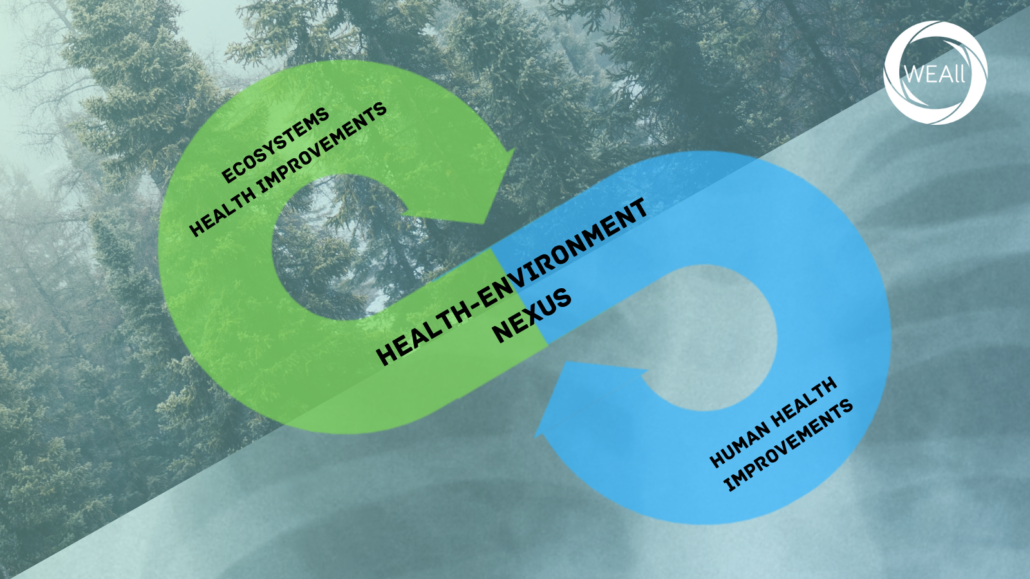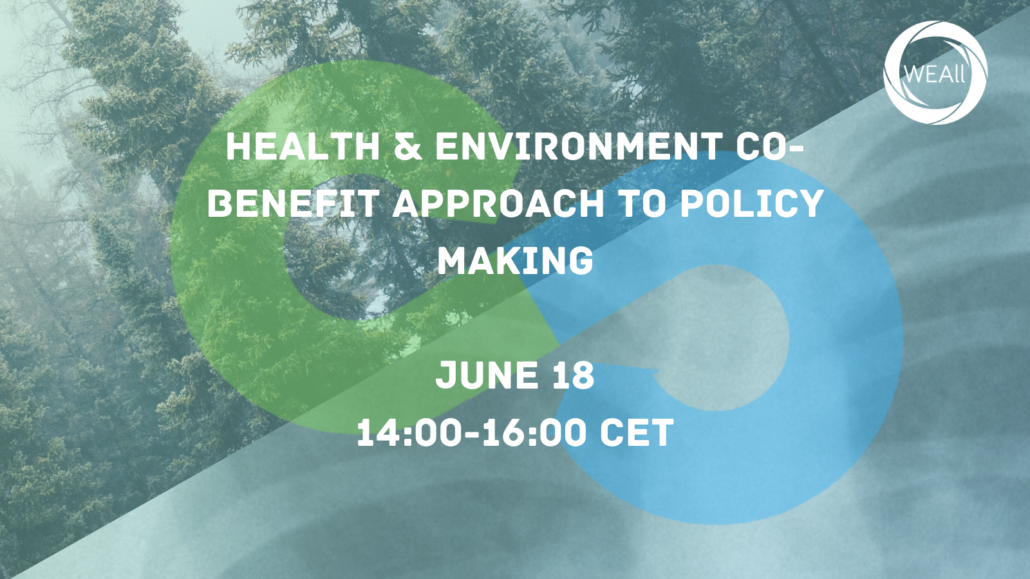This website uses cookies so that we can provide you with the best user experience possible. Cookie information is stored in your browser and performs functions such as recognising you when you return to our website and helping our team to understand which sections of the website you find most interesting and useful.
As part of our work to amplify the important work in the Wellbeing Economy movement, these WEAll Weekly Update blogs will share some of the latest and greatest updates from our membership and beyond. Please use the comment box to share any relevant updates from this week and keep the conversation going!
Weekly Reads

NEW WEAll Publication: Health and the Environment
NEW WEAll Scotland Report: Business and a Wellbeing Economy
How to achieve a ‘health renaissance’ – Social Europe
“First and foremost, recognise the health-environment nexus as the core of planetary health and evolve from cost-benefit analysis to recognition of ‘co-benefits’”
Una politica ambientale-sanitaria per il Rinascimento della sanità globale
Rethinking Values and Well-being – Dirk Philipsen
“Today, we can retell the stories above in greater detail, and with more knowledge and understanding. Yet the debate remains the same: how to think about the benefits and costs of growth-based progress? Or, even more simply: what constitutes a good life?”
Well-Being Economics by Paul Dalzi and Trudi Cameron
“This article provides an overview of well-being economics, with particular attention to public health”
Data as asset? The measurement, governance, and valuation of digital personal data by Big Tech by Kean Birch, DT Cochrane, Callum Ward
We analyse the transformation of personal data into an asset in order to explore how personal data is accounted for, governed, and valued by Big Tech firms and other political-economic actors (e.g., investors).
House of Commons Finance Bill
Building A Wellbeing Economy Roadmap for Towns– Thriving Places Index
The collective efforts of citizens, communities, businesses and governments can be driving towards a much more ambitious and meaningful outcome – the growth of our capacity to thrive.
Building Creative Capacity For a Flourishing Future – Flourishing Fiction Co-Lab
“We posit the root causes of today’s existential crises will never be managed out of existence. That’s why we need to stretch and grow our imaginative capacities, so we might reliably conceive of and create the future we are capable of — individually and collectively.”
Safety in the Face of the Climate Crisis – Jamie Greenberger
Utilizing States at Risk’s data set, we narrowed down exactly which threats each state faces to determine the safest and most vulnerable locations. We also surveyed over 1,000 people to get a better idea of how the public approaches the climate crisis.
A Global MetaUniversity to Lead by Design to a Sustainable Well-Being Future – Robert Costanza, Ida Kubiszewski Tom Kompas & Paul C. Sutton
Building a global collaborative consortium of universities and other educational institutions can move this agenda forward. We describe how this “MetaUniversity” could be structured and how it would serve to advance this agenda and lead the way to a sustainable well-being future for humanity and the rest of nature.
The importance of resource security for poverty eradication – Mathis Wackernagel, Laurel Hanscom, Priyangi Jayasinghe, David Lin, Adeline Murthy, Evan Neill & Peter Raven
We examine the implications for poverty eradication when overshoot (living off the depletion of biological capital) is no longer an option. In that era, humanity’s physical metabolism must stem entirely from Earth’s biological regeneration
Community Building for Systems Change – Finance Innovation Lab
This paper explores the role of community in building in systems change, the potential for community building to contribute to creating system-level impact, and how we can build communities that have high potential for achieving systemic change.
A Just(ice) transition is a post-extractive transition – War on Want
This failure to take inequality and injustice seriously can be seen in even the most ambitious models of climate mitigation.
Our Homes, Our Communities: How Housing Acquisition Strategies Can Create Affordable Housing, Stabilize Neighborhoods, and Prevent Displacement
This report details strategies that cities can lead to creating equitable housing outcomes for residents by moving privately owned rental housing into tenant or nonprofit ownership to avoid speculation, promote community control, and create permanently affordable housing.
Towards a wellbeing economy that serves people and nature – European Environmental Bureau
This report, “provides a blueprint for the transition to a wellbeing economy which is built on three main pillars which can be referred to as the three Ds: the dismantling of exploitative structures, democratising economic governance and degrowing the economy.”
Job Openings & Opportunities
- Bounce Beyond Call for Self-Nominations
- Future Rising Fellowships
- Happier Lives Insitute– Various Positions
- Movement Building and Campaigns Lead (full-time/part-time) – Finance Innovation Lab
- Research Jam – New Economy Network Australia
- Breadwinners – Various Positions
- Secrets to Building a B Corp Consulting Practice – LIFT Economy
- Share your Climate Stories – 350.org
What to Watch
- Covid 19 from an Intersectional Gendered Perspective – Looking Beyond the Obvious – with Liepollo Pheko
- Seeding Change (Cambio de siembra) I Economía positiva with Ana Gómez
- The Economy of Wellbeing: A Holistic Approach to Achieve the Agenda 2030 Goals – with Amanda Janoo
- Powerful Communities: Wealth & Wellbeing conference – with Katherine Trebeck
Listen Up
- Girls’ education is key to climate change solutions
- The Useful and Kind Podcasts
- Extreme Listening with Deeyah Khan | A Bit of Optimism (Podcast): Episode 11.
- Eat the Rich– Invisibilia
Upcoming Events

- June 18: Health and Environment Co-Benefit Approach to Policy
- May 21-23: Earth Action Hub Event
- May 21: Claremont EcoForum
- May 23: Reworlding
- May 25: Fire Circle featuring Elder Anita Sanchez
- May. 25: Fiscal Policy, Debt and Politics: Lessons from Latin America
- May 26 & 27: European Social Economy Summit
- May 26 & 27: Fire Circle featuring Elder Anita Sanchez
- May 31: UNDP event on ECG and other alternative economic models
- June 1: Enhancing Post-Pandemic Sustainability and Resilience: Paving the Way for Systemic Change
- June 2: Video Screening & Q&A: ‘Ecological Economics’
- June 2-4: Conference – Women, Solidarity, and Ecology
- June 8: Stories for Life Event
- June 5-27: Ancient Wisdom Training
- June 20 : World Localization Day – Local Futures
- June 24: Research Jam with NENA
- June 23-25: Ouishare Fest
- Systems Innovation Event Series
- Next Economy MBA “Meet the Instructors” – LIFT Economy
- Regeneration Pollination “Speed Networking” Events – the Global Regeneration CoLab
WEAll Originals
Blogs:
- Five Pathways Towards Health-Environment Policy in a Wellbeing Economy
- [Report] Business and a Wellbeing Economy: Creating Thriving Businesses and a Thriving Scotland
- Two sides of the same coin: New Zealand’s 2021 ‘recovery’ and ‘wellbeing’ Budget
- Scotland CAN B: Building a nationwide culture of business as a force for good in Scotland
- The WEAll global Amp team has transitioned to four-day week: here’s why
Publications:
- WEAll Medium Publication
- Children’s Wellbeing Budget by Dr. Katherine Trebeck
- WEAll Policy Design Guidebook
- Stories For Life
- Wellbeing Economy Messaging Guide– Positive Money, PIRC, NEON, and WEAll
- Measuring Wellbeing, Rutger Hoekstra
- Business in the Wellbeing Economy, Olga Koretskaya & Gus Grosenbaugh
From the Archives
- 10 Principles to Build Back Better
- Rebuilding to a US Wellbeing Economy
- What is a Wellbeing Economy?
- The Business of Wellbeing Guide
the discussion?
Let us know what
you would like
to write about!

